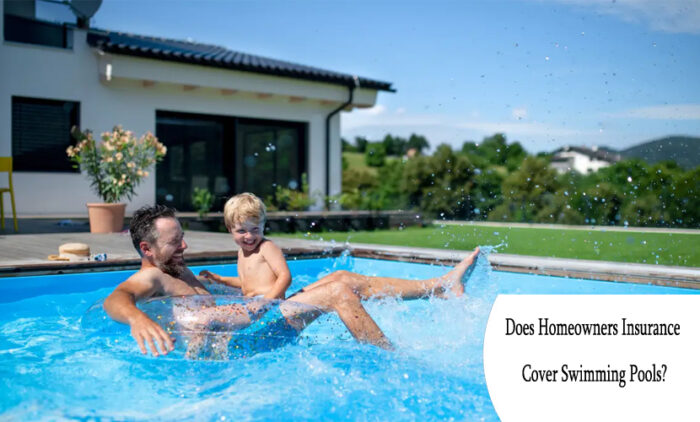Does homeowners insurance cover swimming pools? Pools are usually included under the “other structures” section of a homeowner’s policy, alongside structures like sheds and garages. However, the extent of coverage can vary based on your policy type.

For instance, HO3 or HO5 policies may offer coverage for pools. While HO1, HO2, or HO8 policies might not include such coverage.
It’s important to notify your insurance company when you install a pool. This is to ensure they are aware of the added exposure. And may recommend adjustments to your policy to adequately protect your investment.
Homeowners’ insurance can cover swimming pools under certain conditions, but the specifics depend on your policy type and insurer.
It’s essential to review your policy, notify your insurance company about the pool installation, and potentially make adjustments to ensure adequate coverage for your pool against various risks.
When Does Homeowners Insurance Cover Swimming Pools?
Homeowners insurance covers swimming pools when damage is caused by covered perils like storms or fires.
Swimming pools are usually covered under the “other structures” section of a homeowner’s policy, alongside structures like sheds and garages.
The coverage for swimming pools can vary based on the type of pool you have. For instance, in-ground pools are often covered under the other structures category. While above-ground pools may fall under personal property coverage.
However, it’s important to disclose the presence of a pool to your insurance company. This is to ensure coverage and potentially make adjustments to your policy to adequately protect your investment.
Homeowners insurance covers swimming pools, but the specifics depend on your policy type and the way it is written.
It’s essential to understand the coverage limits, notify your insurer about the pool installation, and potentially adjust your policy to ensure adequate protection for your swimming pool against various risks.
When Does Homeowners Insurance Not Cover Swimming Pools?
Homeowners insurance does not cover swimming pools in certain situations. Insurance may not cover pool-related injuries if the policyholder fails to meet specific guidelines. Guidelines such as having a self-latching, gated fence around the pool perimeter, or adequate safety measures like alarms on gates.
Additionally, insurance might not cover damages caused by excluded perils like earthquakes or intentional damage to the pool by the insured.
Failure to disclose the presence of a pool to the insurance company can lead to coverage denial. This is because lack of disclosure can be viewed as fraud, potentially resulting in legal battles and claim denials.
It’s important to understand the limitations of coverage and ensure compliance with safety requirements to avoid potential gaps in insurance protection for swimming pools.
Does Homeowners Insurance Cover Pool Damage?
Yes, it does, but it depends on what caused the damage. Home insurance covers pool damage if it’s caused by perils like storms, fires, or vandalism. For instance, if a tree falls during a windstorm and damages your pool, repairs are likely to be covered under your policy.
However, it’s important to note that damage resulting from earthquakes, floods, poor maintenance, or wear and tear is not covered by standard homeowners insurance.
Additionally, whether your policy considers your pool as part of your home or falls under “other structures” coverage can vary by state and policy type.
While homeowners insurance can cover pool damage from specific perils, it’s crucial to review your policy for details on coverage limitations and exclusions.
Understanding the terms of your policy and ensuring proper maintenance of your pool can help you effectively navigate potential claims related to pool damage.
Does Homeowners Insurance Cover Pool-Related Injuries?
Yes, homeowners insurance may cover pool-related injuries, depending on the circumstances. Liability coverage in a homeowner’s insurance policy can help pay for expenses if a guest is injured at your pool.
This coverage extends to incidents where the homeowner is found negligent for bodily injury or property damage sustained by another person.
It’s important to ensure that you have adequate liability coverage, especially as pool ownership increases liability risks, potentially necessitating higher coverage limits to protect your financial well-being.
Additionally, having safety features in place, such as fencing and other precautions, can help reduce the risk of injuries and liability claims related to your pool.
How To Safeguard Your Swimming Pool?
To safeguard your swimming pool, consider implementing the following measures:
Install a Pool Fence
Erect a dedicated pool fence at least 4 feet high with self-latching gates to prevent unsupervised access to the pool area, ensuring it has no gaps that children can sneak through.
Use Pool Alarms
Install pool alarms on gates, fences, or around the pool perimeter to alert you when someone enters the pool area or the water, providing an additional layer of safety against unauthorized access.
Remove Toys and Ladders
Keep pool toys, ladders, and access steps out of the pool area when not in use to prevent attracting children to the water unsupervised, reducing the risk of accidents.
Learn CPR
Knowing CPR can be life-saving in emergencies, especially during swim parties. Immediate CPR can significantly improve survival chances after cardiac arrest.
Frequently Asked Questions
Is My Pool Covered Under My Homeowners Policy?
The coverage for pools under homeowners insurance can vary based on the policy type and how the pool is classified (e.g., as part of the home’s structure or as an unattached structure).
Do I Need Extra Insurance Coverage For A Pool?
While pools are covered under homeowners insurance, having a pool can increase liability rates. This often necessitates increased liability coverage or an umbrella policy for additional protection.
Does Home Insurance Cover Pool Collapse?
Pool collapse may not always be covered by insurance unless it is caused by a covered peril like a falling tree during a storm. Factors like lack of maintenance or neglect may impact coverage for pool collapse.
Is Freeze Damage Covered By Insurance For Pools?
Freeze damage and damage from ice and snow, common causes of pool collapse, are often excluded from homeowner’s insurance policies.
Regularly monitoring your pool during the winter and taking preventive measures can help mitigate the risk of freeze-related damage.
Are Pool Cracks Covered By Insurance?
Pool cracks caused by covered perils are generally covered by insurance. While those resulting from non-covered perils may not be covered.
Proper pool maintenance is essential to prevent cracks and ensure coverage for repair costs under your policy.
See Also: Best Homeowners Insurance Companies



